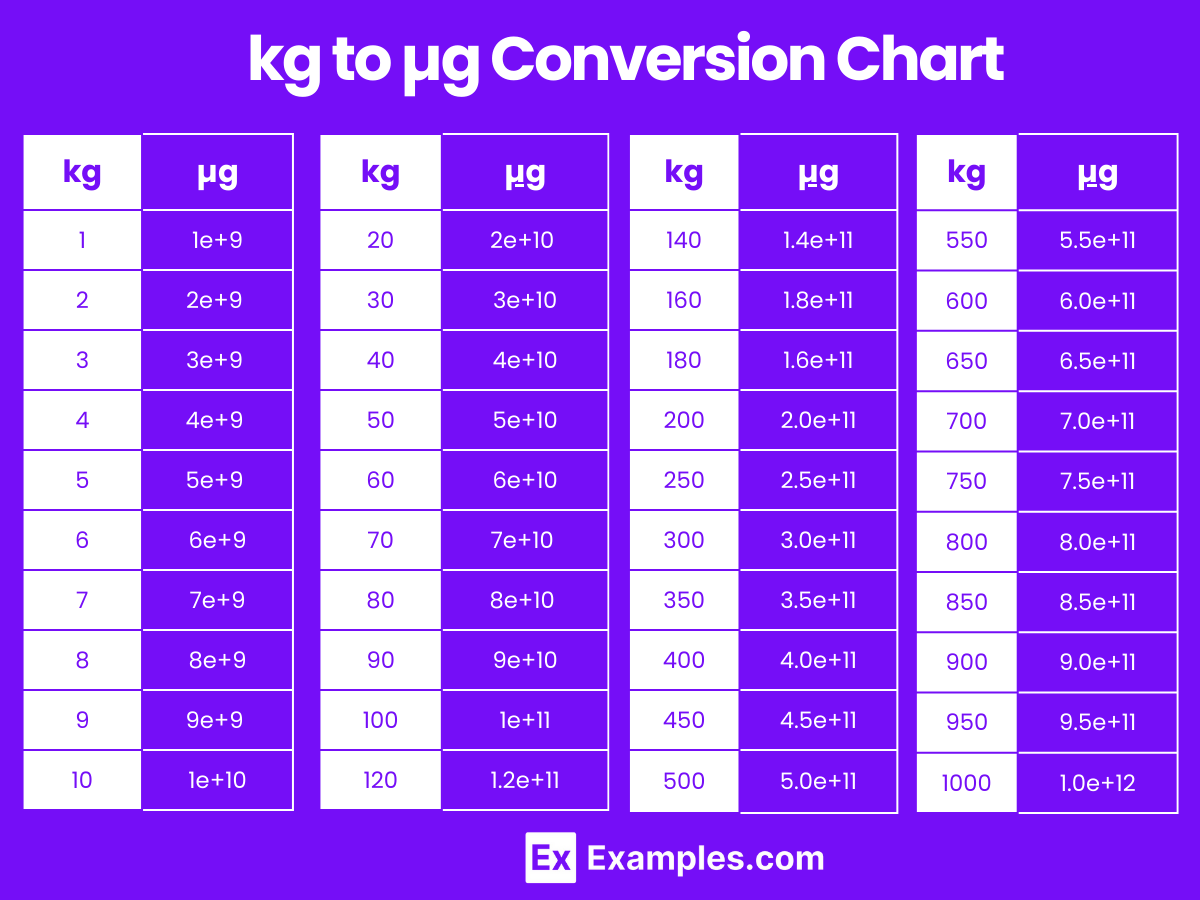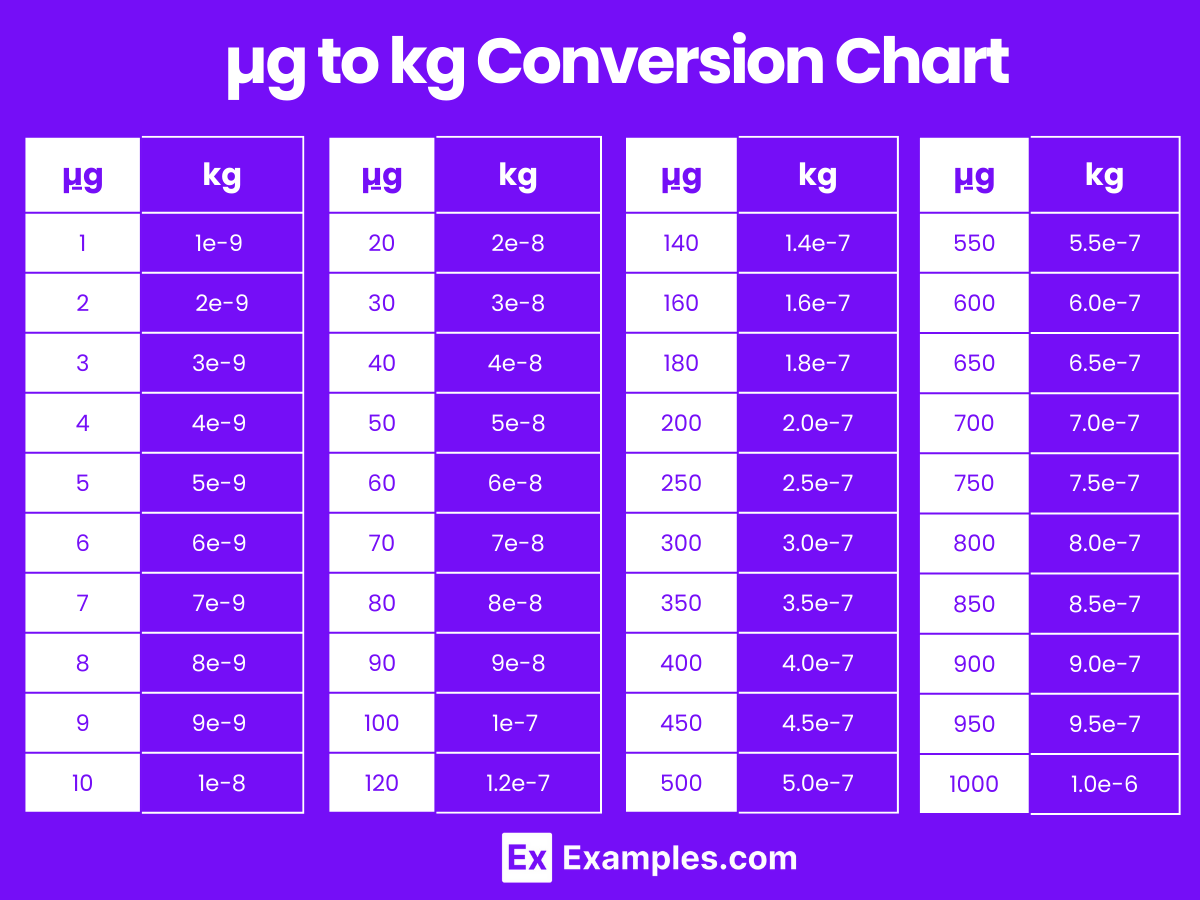Quickly convert kilograms to micrograms and vice versa at Examples.com. Enter your measurements for instant and precise conversion results.
Kilogram to Microgram
Formula: Mass in Microgram (μg) = Mass in Kilogram (kg) × 109
| Kilogram | Microgram |
|---|---|
| 1 | 1000000000 |
Microgram to Kilogram
Formula: Mass in Kilogram(kg) = Mass in Microgram (μg) × 10-9
| Microgram | Kilogram |
|---|---|
| 1 | 0.000000001 |
Mass Converters to Kilogram (kg)
| Tonne to Kilogram | Gram to Kilogram | Milligram to Kilogram |
| Microgram to Kilogram | Imperial ton to Kilogram | US ton to Kilogram |
| Stone to Kilogram | Pound to Kilogram | Ounce to Kilogram |
Mass Converters to Microgram (µg)
| Tonne to Microgram | Kilogram to Microgram | Gram to Microgram |
| Milligram to Microgram | Imperial ton to Microgram | US ton to Microgram |
| Stone to Microgram | Pound to Microgram | Ounce to Microgram |
Conversion Factors:
- Kilograms to Micrograms: 1 kilogram = 1,000,000,000 micrograms
- Micrograms to Kilograms: 1 microgram = 1/1,000,000,000 kilograms
How to Convert Kilograms to Micrograms:
To convert kilograms to micrograms, multiply the number of kilograms by 1,000,000,000.
Micrograms=Kilograms×1,000,000,000
Example: Convert 2 kilograms to micrograms.
Micrograms=2×1,000,000,000=2,000,000,000 µg
How to Convert Micrograms to Kilograms:
To convert micrograms to kilograms, multiply the number of micrograms by 0.000000001.
Kilograms=Micrograms×0.000000001
Example: Convert 3,000,000,000 micrograms to kilograms.
Kilograms=3,000,000,000×0.000000001=3 kg
Kilograms to Micrograms Conversion Table
| Kilograms (kg) | Micrograms (µg) |
|---|---|
| 1 kg | 1e+9 µg |
| 2 kg | 2e+9 µg |
| 3 kg | 3e+9 µg |
| 4 kg | 4e+9 µg |
| 5 kg | 5e+9 µg |
| 6 kg | 6e+9 µg |
| 7 kg | 7e+9 µg |
| 8 kg | 8e+9 µg |
| 9 kg | 9e+9 µg |
| 10 kg | 1e+10 µg |
| 20 kg | 2e+10 µg |
| 30 kg | 3e+10 µg |
| 40 kg | 4e+10 µg |
| 50 kg | 5e+10 µg |
| 60 kg | 6e+10 µg |
| 70 kg | 7e+10 µg |
| 80 kg | 8e+10 µg |
| 90 kg | 9e+10 µg |
| 100 kg | 1e+11 µg |
kg to µg Conversion Chart

Micrograms to Kilograms Conversion Table
| Micrograms (µg) | Kilograms (kg) |
|---|---|
| 1 µg | 1e-9 kg |
| 2 µg | 2e-9 kg |
| 3 µg | 3e-9 kg |
| 4 µg | 4e-9 kg |
| 5 µg | 5e-9 kg |
| 6 µg | 6e-9 kg |
| 7 µg | 7e-9 kg |
| 8 µg | 8e-9 kg |
| 9 µg | 9e-9 kg |
| 10 µg | 1e-8 kg |
| 20 µg | 2e-8 kg |
| 30 µg | 3e-8 kg |
| 40 µg | 4e-8 kg |
| 50 µg | 5e-8 kg |
| 60 µg | 6e-8 kg |
| 70 µg | 7e-8 kg |
| 80 µg | 8e-8 kg |
| 90 µg | 9e-8 kg |
| 100 µg | 1e-7 kg |
µg to kg Conversion Chart

Differences Between Kilograms to Micrograms
| Feature | Kilograms (kg) | Micrograms (µg) |
|---|---|---|
| Definition | Metric unit of mass equal to 1,000 grams | Metric unit of mass equal to 0.000001 grams |
| Symbol | kg | µg |
| Equivalent in Grams | 1 kilogram = 1,000 grams | 1 microgram = 0.000001 grams |
| Conversion Factor | 1 kilogram = 1,000,000,000 micrograms | 1 microgram = 0.000000001 kilograms |
| Usage | Commonly used for larger quantities of mass | Commonly used for very small quantities of mass |
| Metric System | Part of the metric system | Part of the metric system |
| Precision | Suitable for measuring larger weights | Suitable for measuring extremely small weights |
| Common Applications | Used in science, industry, and daily life for larger items | Used in pharmaceuticals, chemistry, and precise measurements |
| Calculation Ease | Easier for bulk measurements | Requires conversion for larger scales |
| Adoption | Widely adopted internationally | Widely adopted internationally |
1. Solved Examples on Converting Kilograms to Micrograms
Example 1
Problem: Convert 3 kilograms to micrograms.
Solution: 3 kg×1,000,000,000=3,000,000,000 µg
3 kilograms is 3,000,000,000 micrograms.
Example 2
Problem: Convert 5 kilograms to micrograms.
Solution: 5 kg×1,000,000,000=5,000,000,000 µg
5 kilograms is 5,000,000,000 micrograms.
Example 3
Problem: Convert 2 kilograms to micrograms.
Solution: 2 kg×1,000,000,000=2,000,000,000 µg
2 kilograms is 2,000,000,000 micrograms.
Example 4
Problem: Convert 10 kilograms to micrograms.
Solution: 10 kg×1,000,000,000=10,000,000,000 µg
10 kilograms is 10,000,000,000 micrograms.
Example 5
Problem: Convert 0.5 kilograms to micrograms.
Solution: 0.5 kg×1,000,000,000=500,000,000 µg
0.5 kilograms is 500,000,000 micrograms.
2. Solved Examples on Converting Micrograms to Kilograms
Example 1
Problem: Convert 3,000,000,000 micrograms to kilograms.
Solution: Kilograms=Micrograms×0.000000001
3,000,000,000×0.000000001=3 kg
3,000,000,000 micrograms is 3 kilograms.
Example 2
Problem: Convert 5,000,000,000 micrograms to kilograms.
Solution: 5,000,000,000×0.000000001=5 kg
5,000,000,000 micrograms is 5 kilograms.
Example 3
Problem: Convert 2,000,000,000 micrograms to kilograms.
Solution: 2,000,000,000×0.000000001=2 kg
2,000,000,000 micrograms is 2 kilograms.
Example 4
Problem: Convert 10,000,000,000 micrograms to kilograms.
Solution: 10,000,000,000×0.000000001=10 kg
10,000,000,000 micrograms is 10 kilograms.
Example 5
Problem: Convert 500,000,000 micrograms to kilograms.
Solution: 500,000,000×0.000000001=0.5 kg
500,000,000 micrograms is 0.5 kilograms.
What are common applications of converting kilograms to micrograms?
Common applications include dosage calculations in medicine, laboratory measurements, and scientific data analysis.
Why is converting kilograms to micrograms important?
This conversion is important in fields requiring precise measurements, such as chemistry, pharmacology, and scientific research.
Can I use an online calculator for this conversion?
Absolutely, many online calculators can convert kilograms to micrograms quickly and accurately.
Are there specific tools for converting kilograms to micrograms?
Yes, there are many digital tools, mobile apps, and online converters specifically designed to convert kilograms to micrograms.
Is it possible to convert fractional kilograms to micrograms?
Yes, you can convert fractional kilograms to micrograms by multiplying the fractional value by 1,000,000,000. For example, 0.5 kg equals 500,000,000 µg.
How do industries use the conversion from kilograms to micrograms?
Industries use this conversion for precise measurements in pharmaceuticals, chemical manufacturing, and scientific research to ensure accuracy and consistency.

